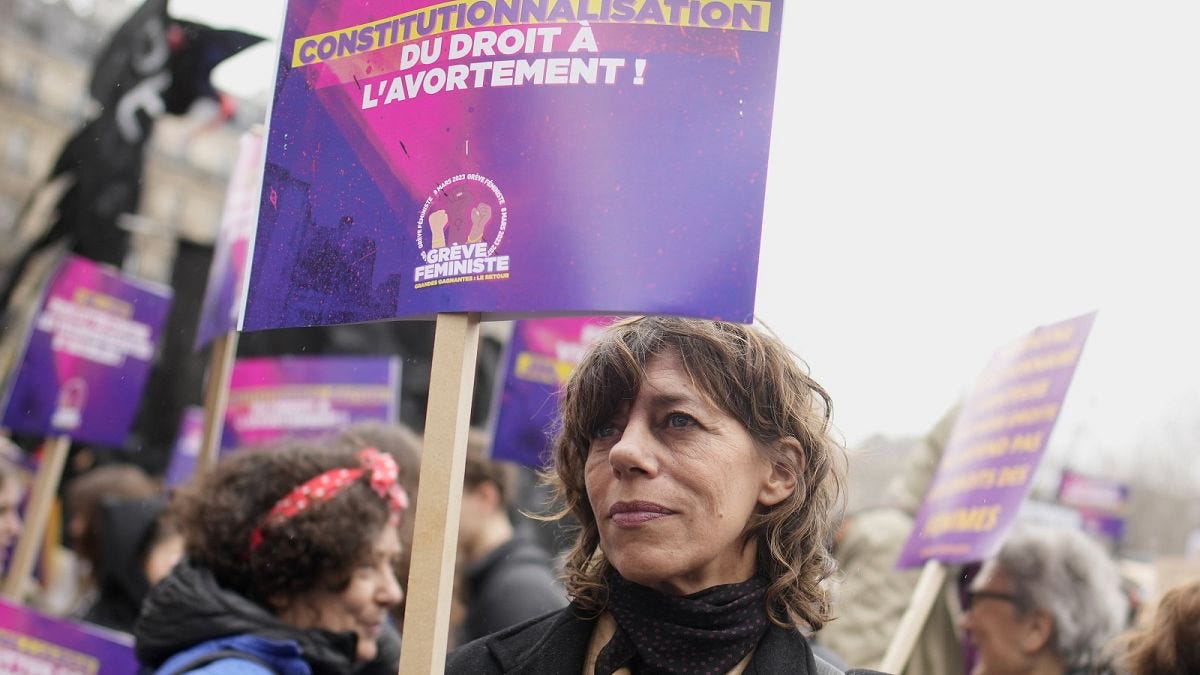Global Roundup: Pioneering Maasai Women, Pakistani Painting Competition for Gender Equality, Somalian All-Women Current Affairs TV Show, France Abortion Rights, Trans Monologue in a Women’s Bathroom
Curated by FG Contributor Inaara Merani
Everlyne Siololo is a driver guide for Gamewatchers Safaris, which protects community land in the Mara Ripoi conservancy. Photograph: Edwin Ndeke/The Guardian.
Maasai women in Kenya are carving out space for themselves in a domain that has long been dominated by men. Although Maasai societies are very patriarchal and governance is typically led by men, a new generation of women are taking on leadership roles and safari guide jobs, challenging the current status quo in Maasai society.
The Mara Ripoi conservancy is one of the few conservancies in the greater Mara ecosystem in Kenya where women hold administrative rights. Here, they are able to make decisions on cattle grazing zones and financial matters, as well as discuss employment opportunities, including discussions about whether or not women should be allowed to take on certain roles.
Two-thirds of protected land in the continent of Africa lies outside national parks, therefore conservancies have been established to protect those vital habitats. A conservancy is formed on land that is collectively owned and operated by Indigenous communities, like the Maasai, and it is set aside for protection to prevent any developments. The community residing and running the conservancy also earns income by partnering with wildlife tourism companies.
Everylyne Siololo is now provided with an independent income. As she was too young to become a chief, she began working as a driver-guide with Gamewatchers Safaris, a nearby tour company that protects around 40,000 acres of community land in the Maasai Mara. Many other women in the Ripoi have been able to earn an independent income thanks to their jobs as a safari tour guides, however their lives must remain balanced between their jobs, attending to conservancy governance matters, as well as domestic work.
A local chief urged my father to take me to school, though most of my siblings are uneducated. After college, I too wanted to become a chief, to ensure all girls in our village are enrolled in school, while any dropouts were assisted to continue with their education. Empowering a woman is about safeguarding community interests. – Everlyne Siololo
Students participate in a painting competition organised by International Governance and Sustainability Institute at the Islamabad College for Girls, F-6/2, on Tuesday – White Star. (DAWN)
In Islamabad, a painting and computer poster competition, titled “Empower Women – Empower Pakistan”, is promoting the UN’s Sustainable Development Goals (SDGs) and gender equality and women’s empowerment. This competition witnessed the active participation of 34 girls from 17 colleges across Islamabad.
Collaboration between the International Governance and Sustainability Institute (IG–SI) and the Federal Directorate of Education led to this initiative at the Islamabad College for Girls F-6/2. Prizes were given out to top contenders in the competition, including first prize in the painting competition to Eman Asif, and first prize in the computer poster competition to Afzeen Fatima.
Founder of the IG-SI and former Inspector General of Police, Dr Sultan Azan Temuri addressed those who attended the competition, and cited the need for Pakistan to strengthen its measures on gender equality. Currently, the nation ranks 142 out of 146 in gender equality. Dr Temuri outlined the needs by both local and international efforts, especially within the local police force, to implement programming that empowers women and bridges the gender gap. To create an inclusive and supportive environment, he also advocated for comprehensive strategies including education, economic participation, and technological empowerment.
Helena Iqbal Saeed, law enforcement and gender expert at IG-SI, and Esin Gulsen, Director of Operations at IG-SI, also emphasized the need for women to break free from gender stereotypes, pursue their interests, and excel in their careers despite challenges. Women’s empowerment is crucial now more than ever in Pakistan, and young students are the future of progress and empowerment.
Bilan journalists on assignment in Baidoa, where they decided to go barefoot like thhe people they were interviewing. Photograph: Courtesy of Bilan. (The Guardian)
Bilan, Somalia’s only all-women media team, is launching the country’s first current affairs TV show to be hosted by a woman. The show intends to address subjects such as the shortage of women teachers, environmental issues, as well as the challenges faced by women trying to get into politics. This will also be the first program on Somali television to have a panel of at least 50 percent women.
The show plans to launch on International Women’s Day, March 8. The show’s format will mimic that of the BBC’s Question Time, where hosts visit and tour venues across the country and invite audience members to take part. After the successful launch of its pilot in December where period education in schools was debated, the show is on a path for great success.
One young woman in the audience shared her own experience. She remembered the exact time and day when her period started because she had no idea what was happening. She thought she was dying. It was only after she told her older sister, that she understood. Women, including me, never had the opportunity to learn about periods as girls; even our own mums don’t discuss it. People think this is taboo, but it is a fact; it exists and we cannot ignore it. – Naima Said Salah, host
Established in 2022 with support from the United Nations Development Programme, Bilan is based in the capital of Somalia, Mogadishu. The program began with six journalists, led by Nasrin Mohamed Ibrahim, one of the few women senior news producers in the country. After receiving funding from the EU for the next three years, Bilan plans to expand into federal states in 2024, recruiting 20 new journalists and offering investigative reporting grants to 10 others.
All six founding members of Bilan have reported experiencing discrimination and harassment in their careers. This project was created to offer women a safe space to tell their stories they wanted to tell, and the show will continue to cover important and stigmatized issues in society, such as Somalis living with HIV, child abuse, postnatal depression, and more. Given the male-dominated and politics-focused stance that most news outlets take in Somalia, Bilan will be a breath of fresh air.
One reason why women’s stories are rarely told in the Somali media is that most reporters are men. Bilan will change that. Women will speak to us because we too are women. They will allow us into their homes, their prayer rooms and their private spaces. – Nasrin Mohamed Ibrahim
A woman demonstrates with a poster reading “Abortion in the Constitution” as part of the International Women’s Day, Wednesday, March 8, 2023 in Paris. - Copyright Christophe Ena/AP Photo. (Euro News)
France’s National Assembly began on Tuesday the process of enshrining women’s rights to abortion in the French Constitution. Introducing the bill is only the first step in this journey, as this legislative process also requires a vote in the Senate.
France rolled out this process after President Emmanuel Macron promised to secure women’s rights to abortion in France, following a rollback of rights int he US. Macron’s government wants to amend Article 34 of France’s constitution to include that a women’s right to an abortion is guaranteed. The constitutional amendment must pass through both chambers of parliament, and then must be approved in a majority joint-session of parliament.
In 1975, abortion was decriminalized in France, but there is currently nothing in the constitution which guarantees abortion rights for French women. In its introduction to the bill, the French government emphasized how the right to an abortion is now threatened in the US after the Supreme Court overturned a 50-year-old ruling granting American women access to abortions.
Unfortunately, this event is not isolated: in many countries, even in Europe, there are currents of opinion that seek to hinder at any cost the freedom of women to terminate pregnancy if they wish. – Introduction to the French legislation
Across European nations, governments are tightening up on their stances towards women’s rights and LGBTQ+ rights. For example, in some countries pro-LGBTQ+ propaganda and Pride parades have been banned, outright expressions of one’s gender or sexuality or engaging in same-sex activity is criminalized, and a woman’s right to abortion is not secure. Many politicians feel that now is the time to ensure that women’s and LGBTQ+ rights are enshrined into the law, preventing any further discrimination or hardship in the future.
‘It’s rare for actors to get an hour to themselves on stage to show off the breadth of their emotion. It’s even rarer for a trans girl’… Australian actor Janet Anderson in Overflow. Photograph: Robert Catto/Robert Catto/robertcatto.com. (The Guardian)
During the pandemic restrictions in 2020, UK artist and playwright Travis Alabanza was tasked with creating a Covid-friendly play that was for a single performer, on a static set, with minimal staff involved. The result was “Overflow”, a 70-minute monologue set in a club bathroom.
The play received critical acclaim in the UK and then in Australia in 2022, where, for the first time in the country’s history, it was led by an all-trans and gender-non conforming team at the Darlinghurst Theatre Company. Now, Overflow makes a return at Sydney film festival before completing showings in Melbourne and Geelong.
Alabanza wrote the play fuelled by lockdown panic and that feeling of being trapped, but from a different perspective. The play was fuelled by the right wing moral panic against trans people using public bathrooms that match their gender.
Whilst the pandemic was continuing, despite public space not being able to be accessed, trans people in bathrooms were still being talked about. I found that such a weird feeling – like, public space doesn’t even exist any more and we’re still debated about. – Travis Alabanza
Rosie, the protagonist, is in a club bathroom where she has locked herself in to hide from transphobic attackers. To distract herself, she reminisces about encounters in club bathrooms – the good, the bad, and the sacred – while a leaky tap slowly fills the sink and threats lurk on the other side of the door. Alabanza has described this piece as “a mediation on public space”.
In addition to the messaging provided in Overflow, the play has also given trans and gender-nonconformist performers the opportunity to act in roles that they feel comfortable and represented in, and to work with other trans and gender-nonconforming actors, which is rare.
I met everyone, and they were all trans and gender-noncomforming. And I’ve never experienced that with my work. I’ve tried with my work to have as many trans creatives, but I’ve never experienced everyone. The energy was incredible. It felt like a club. It felt as much like a club as a threader could…It’s rare for actors to get an hour to themselves on stage to show off the breadth of their emotion. It’s even rarer for a trans girl to get that moment and to be like ‘this is what I can do’. – Travis Alabanza
Inaara Merani (she/her) recently completed her Masters degree at the University of Western Ontario, studying Gender, Sexuality, and Women’s Studies with a specialization in Transitional Justice. In the upcoming years, she hopes to attend law school, focusing her career in human rights law.
Inaara is deeply passionate about dismantling patriarchal institutions to ensure women and other marginalized populations have safe and equal access to their rights. She believes in the power of knowledge and learning from others, and hopes to continue to learn from others throughout her career.






